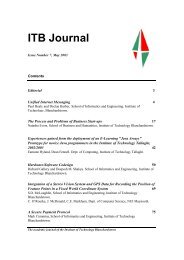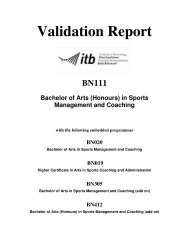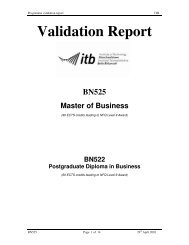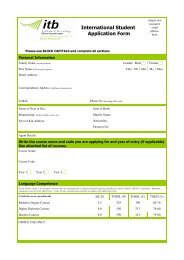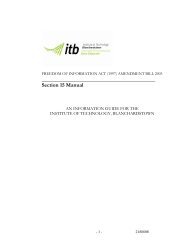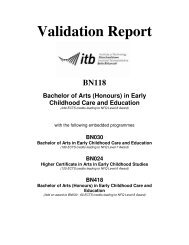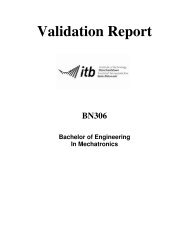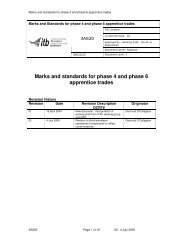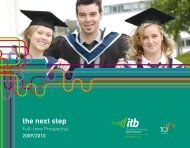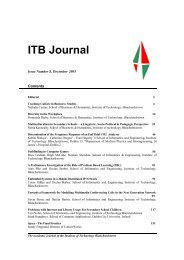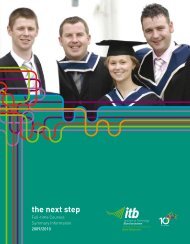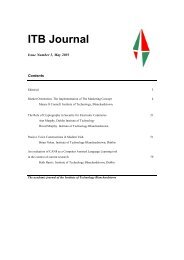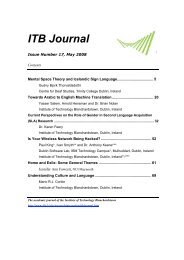- Page 1 and 2: ITB Journal Issue Number 9, May 200
- Page 3 and 4: Editorial ITB Journal I am delighte
- Page 5 and 6: ITB Journal Application of the Houg
- Page 7 and 8: ITB Journal The proliferation of th
- Page 9 and 10: 3.1 Speech Input ITB Journal Figure
- Page 11 and 12: ITB Journal Given a speech corpus w
- Page 13 and 14: 3. Convert to Mel Spectrum ITB Jour
- Page 15 and 16: L-1 ITB Journal c[n] = ∑ ln(S[i])
- Page 17 and 18: ITB Journal The Java programming la
- Page 19 and 20: ITB Journal Design of a Wear Test M
- Page 21 and 22: a1 = depth of cut D1 = diameter of
- Page 23 and 24: ITB Journal The corresponding perip
- Page 25 and 26: ITB Journal Diamond Crystal Size Di
- Page 27 and 28: References ITB Journal [1] Jennings
- Page 29 and 30: ITB Journal This is where the area
- Page 31 and 32: ITB Journal decades addressing chal
- Page 33 and 34: ITB Journal identification of the s
- Page 35 and 36: 6 Adaptive Architecture ITB Journal
- Page 37 and 38: Intuitors ITB Journal Simulations a
- Page 39 and 40: ITB Journal learners would be more
- Page 41 and 42: ITB Journal A score of 21 points of
- Page 43: ITB Journal Consistency of Academic
- Page 47 and 48: ITB Journal ‘non-standard’ entr
- Page 49 and 50: ITB Journal Table 3: Whole Group: S
- Page 51 and 52: ITB Journal Secondly, in line with
- Page 53 and 54: ITB Journal Koh, M.Y. and Koh, H.C.
- Page 55 and 56: ITB Journal primary schools in Nort
- Page 57 and 58: ITB Journal Questionnaires were des
- Page 59 and 60: ITB Journal During interviews in 20
- Page 61 and 62: ITB Journal discuss their differenc
- Page 63 and 64: ITB Journal Speech Synthesis for PD
- Page 65 and 66: ITB Journal necessary to use the co
- Page 67 and 68: ITB Journal nested classes and thei
- Page 69 and 70: ITB Journal The timers in FreeTTS w
- Page 71 and 72: ITB Journal platform that does have
- Page 73 and 74: ITB Journal recording the two sampl
- Page 75 and 76: ITB Journal E-Business - Making the
- Page 77 and 78: ITB Journal IDC consultants predict
- Page 79 and 80: ITB Journal Over the last decade, c
- Page 81 and 82: Findings The Role of Marketing ITB
- Page 83 and 84: ITB Journal � search engines need
- Page 85 and 86: ITB Journal managers wish to reinve
- Page 87 and 88: ITB Journal One aspect of AAC is th
- Page 89 and 90: 3.1 Alphabetical Layout ITB Journal
- Page 91 and 92: ITB Journal The object of the exper
- Page 93 and 94: ITB Journal All subjects agreed tha
- Page 95 and 96:
ITB Journal Alphabetical (in WPM) F
- Page 97 and 98:
ITB Journal English Letter Frequenc
- Page 99 and 100:
ITB Journal computer numerical cont
- Page 101 and 102:
ITB Journal Figure 4 Schematic of I
- Page 103 and 104:
J J J J lin sp lp bs � J ext �
- Page 105 and 106:
ITB Journal Nevertheless, we will c
- Page 107 and 108:
ITB Journal The motor “Voltage In
- Page 109 and 110:
ITB Journal We are interested in th
- Page 111 and 112:
ITB Journal van Amerongen Job, Bree
- Page 113 and 114:
ITB Journal entrepreneurial from th
- Page 115 and 116:
ITB Journal entrepreneur and their
- Page 117 and 118:
ITB Journal Empirical research carr
- Page 119 and 120:
ITB Journal The study concludes tha
- Page 121 and 122:
ITB Journal to expand geographicall
- Page 123 and 124:
ITB Journal Many studies have discu
- Page 125 and 126:
ITB Journal There is agreement abou
- Page 127 and 128:
ITB Journal Roberts, E.B.& Senturia
- Page 129 and 130:
ITB Journal to the decision-makers
- Page 131 and 132:
ITB Journal o Making and communicat
- Page 133 and 134:
ITB Journal o Scare tactics e.g.
- Page 135 and 136:
ITB Journal benefits as a result of
- Page 137 and 138:
ITB Journal calculate having superi
- Page 139 and 140:
ITB Journal receives the benefit, w
- Page 141 and 142:
ITB Journal framework does not supp
- Page 143 and 144:
ITB Journal possibility that IT/IS
- Page 145 and 146:
ITB Journal Architecture and develo
- Page 147 and 148:
ITB Journal content (HTML, WML, SVG
- Page 149 and 150:
ITB Journal SAGE deals with one of
- Page 151 and 152:
ITB Journal SRF (Service Route Find
- Page 153 and 154:
ITB Journal supplied conversion too
- Page 155 and 156:
ITB Journal Dublin City Walking Nea
- Page 157 and 158:
ITB Journal Entire New York Search
- Page 159 and 160:
REFERENCES ITB Journal Loehnert E.,
- Page 161 and 162:
ITB Journal equivalent real-world c
- Page 163 and 164:
3.1 Types of Camera Angles ITB Jour
- Page 165 and 166:
3.4 Screen Direction ITB Journal Sc
- Page 167 and 168:
ITB Journal of the principles upon
- Page 169 and 170:
ITB Journal Mascelli, J. V. (1965).
- Page 171 and 172:
ITB Journal Another term principal
- Page 173 and 174:
ITB Journal Synchronous machines ar
- Page 175 and 176:
ITB Journal board 8-channel 12-bit
- Page 177 and 178:
6. Distortion ITB Journal Figure 6
- Page 179 and 180:
ITB Journal [14] R. Pena, J.C. Clar
- Page 181 and 182:
ITB Journal Although these methodol
- Page 183 and 184:
ITB Journal complier or the interpr
- Page 185 and 186:
ITB Journal XP, like the other agil
- Page 187 and 188:
ITB Journal It is hoped that the to
- Page 189 and 190:
ITB Journal loss of equipment perfo
- Page 191 and 192:
ITB Journal The techniques used to
- Page 193 and 194:
Run Order Conveyo r Speed Preheat T
- Page 195 and 196:
Recommendation ITB Journal The adeq
- Page 197 and 198:
ITB Journal Application of the Houg
- Page 199 and 200:
ITB Journal common point. Hence eac
- Page 201 and 202:
3. Experiments and Results ITB Jour
- Page 203 and 204:
ITB Journal Hence these problems ca
- Page 205 and 206:
ITB Journal Investigation Into The
- Page 207 and 208:
ITB Journal A test was developed by
- Page 209 and 210:
Unreliability, F(t) 99.90 90.00 50.
- Page 211 and 212:
ITB Journal Equation 2 and 3 can be
- Page 213 and 214:
ITB Journal Emotion Authentication:
- Page 215 and 216:
ITB Journal � Amplitude variation
- Page 217 and 218:
ITB Journal Figure 1: JitGen4 Struc
- Page 219 and 220:
ITB Journal Although we are of the
- Page 221 and 222:
Voice data Pseudorandom Seed genera
- Page 223 and 224:
ITB Journal Neural Networks for Rea
- Page 225 and 226:
ITB Journal (GA) [Buckland 02]. Thi
- Page 227 and 228:
2.1 Stage One ITB Journal Figure 2.
- Page 229 and 230:
ITB Journal Neural Network Informat
- Page 231 and 232:
ITB Journal A New Integrated Style
- Page 233 and 234:
ITB Journal delivered in engineerin
- Page 235 and 236:
ITB Journal would help determine th
- Page 237 and 238:
ITB Journal Figure 3: CBL of ANOVA
- Page 239 and 240:
ITB Journal Design Study of a Heavy
- Page 241 and 242:
ITB Journal strain for each element
- Page 243 and 244:
Actual modifications Yes ? NO New D
- Page 245 and 246:
5. Calibration procedure ITB Journa
- Page 247 and 248:
ITB Journal Measurement of the Freq
- Page 249 and 250:
ITB Journal narrow region (0.15 µm
- Page 251 and 252:
ITB Journal long t1 can prolong t2
- Page 253 and 254:
ITB Journal The techniques and meas
- Page 255 and 256:
ITB Journal t1 parameter is an impo
- Page 257 and 258:
ITB Journal [6] Schena J, Thompson
- Page 259 and 260:
ITB Journal political goals of the
- Page 261 and 262:
ITB Journal important to note that
- Page 263 and 264:
ITB Journal Many gravitate to the o
- Page 265 and 266:
ITB Journal environmental and socia
- Page 267 and 268:
ITB Journal more participatory demo
- Page 269 and 270:
ITB Journal Ravetz, J. (2000) City
- Page 271 and 272:
ITB Journal to the MN via the two n
- Page 273 and 274:
SERVER MN START_HANDOVER (Session I
- Page 275 and 276:
ITB Journal Our future work will fo
- Page 277 and 278:
ITB Journal ethical guidelines are
- Page 279 and 280:
� Social Responsibility ITB Journ
- Page 281 and 282:
III Unaccompanied Minors ITB Journa
- Page 283 and 284:
ITB Journal presence, for example,
- Page 285 and 286:
ITB Journal Whether research simply
- Page 287 and 288:
ITB Journal These platforms of embe
- Page 289 and 290:
to temperature sensor ITB Journal F
- Page 291 and 292:
Limitations of TINI ITB Journal The
- Page 293 and 294:
ITB Journal Developing Real-Time Mu
- Page 295 and 296:
ITB Journal o Real-time Voice/Video
- Page 297 and 298:
From Analysis to Design Setup/Teard
- Page 299 and 300:
InstantMesManager - Message current
- Page 301 and 302:
References ITB Journal [1] B. Campb
- Page 303 and 304:
ITB Journal a global inter-network
- Page 305 and 306:
ITB Journal while also providing mo
- Page 307 and 308:
3.3 Embedded System Support ITB Jou
- Page 309 and 310:
ITB Journal 5.1 Communication among
- Page 311 and 312:
Code-Listing1: Sensor API code snip
- Page 313 and 314:
ITB Journal Implementing Test Patte
- Page 315 and 316:
ITB Journal A transitional and conv
- Page 317 and 318:
ITB Journal between small voice pac
- Page 319 and 320:
ITB Journal channels have been esta
- Page 321 and 322:
ITB Journal routing intelligence in
- Page 323 and 324:
ITB Journal customers for translati
- Page 325 and 326:
4 Technologies ITB Journal Various
- Page 327 and 328:
ITB Journal 5 Case 1 -
- Page 329 and 330:
ITB Journal options { OUTPUT_DIRECT
- Page 331 and 332:
5.3 Using the Parser ITB Journal Th
- Page 333 and 334:
6.2.1 XSLT Directives and Processin
- Page 335:
ITB Journal http://www.itb.ie Issue



